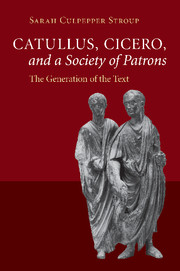Book contents
- Frontmatter
- Contents
- Preface and acknowledgments
- List of abbreviations
- Introduction
- I HOW TO WRITE ABOUT WRITING
- II THE TEXTUALIZATION OF DISPLAY
- III THE MATERIALIZATION OF THE TEXT
- Epilogue
- Appendix: What “Society of Patrons”? A prosopography of the players
- Bibliography
- Index locorum
- Index rerum et nominum
III - THE MATERIALIZATION OF THE TEXT
INTERSECTIONS OF RHETORIC AND SOCIAL PRACTICE (2): THE DEDICATED TEXT AS “ACTING OBJECT”
Published online by Cambridge University Press: 04 August 2010
- Frontmatter
- Contents
- Preface and acknowledgments
- List of abbreviations
- Introduction
- I HOW TO WRITE ABOUT WRITING
- II THE TEXTUALIZATION OF DISPLAY
- III THE MATERIALIZATION OF THE TEXT
- Epilogue
- Appendix: What “Society of Patrons”? A prosopography of the players
- Bibliography
- Index locorum
- Index rerum et nominum
Summary
For when I open a medieval manuscript, and this is different from opening a printed book, I am conscious not only of the manu-script, the bodily handling of materials in production, writing, illumination, but also how in its subsequent reception, the parchment has been penetrated; how it has acquired grease stains, thumb-marks, erasures, drops of sweat; suffered places where images have been kissed away by devout lips or holes from various eating animals.1
If Freud's Shoe was never merely a shoe,2 and Marx's Table was never merely a table,3 it is safe to say that, for the late Republic, the patronal-class dedicated text was very rarely merely a patronal-class dedicated text. The phenomenon of a text being, at least potentially, more than just a text – the phenomenon of the received value of the whole (volume) transcending in value the sum of its material and intellectual components – is one likely naturalized by most readers of this text. But as the fact of this naturalization might be considered to be the single most important contribution of the textual community of the late Republic, it will be useful to finish our study with those aspects of the late Republican community that speak most strongly to those periods that follow, from the obsessively textual worlds of the Principate and Empire to the social and intellectual engagement with textual materiality as it continues into our time.
- Type
- Chapter
- Information
- Catullus, Cicero, and a Society of PatronsThe Generation of the Text, pp. 207 - 215Publisher: Cambridge University PressPrint publication year: 2010



